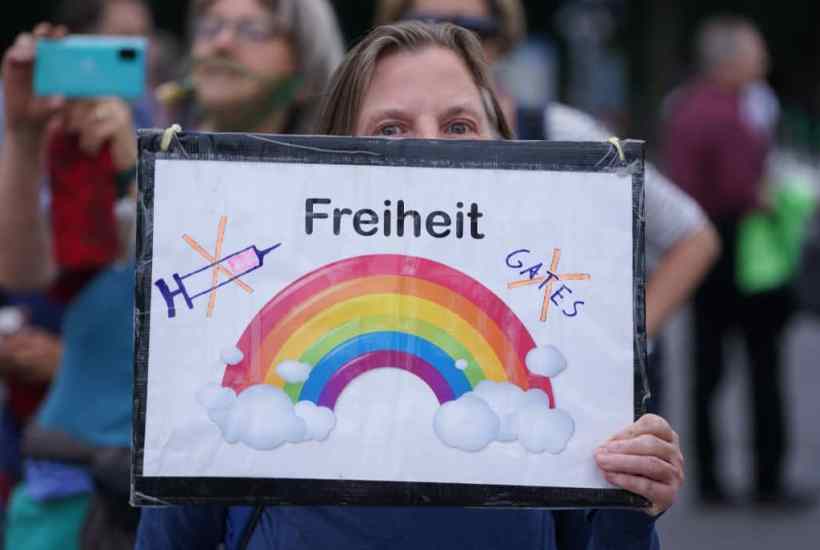By the end of winter, Germans will be ‘vaccinated, recovered or dead,’ according to the country’s health minister Jens Spahn. Yet as Germany battles another wave of Covid outbreaks with renewed restrictions, the outgoing Merkel administration is failing to inspire public confidence in the central government.
In the city of Dresden, which usually hosts some of Germany’s most iconic Christmas markets, the mood is particularly glum. Businesses in the capital of Saxony had been looking forward to welcoming locals and tourists back to the smells of Glühwein and Bratwurst. Months ago they received the green light from state authorities to open up, but then came a shock last Friday: lockdown in Saxony, no Christmas markets, no tourism.
Local events manager Holger Zastrow, who runs two of Dresden’s Christmas markets, says his company’s losses amount to half a million euros (£420,000). Visibly browbeaten he accuses leaders of not caring about the country’s ‘Christmas culture.’ It’s not just the markets where tensions are running high. Dresden’s hotels had also been nearly booked out and were at 90 per cent capacity. Now they will have to cancel bookings and refund disgruntled guests. The losses could run into the tens of millions.
Not everyone is unhappy about the imposition of new restrictions, however: just over half of locals in the region approve of the cancellations because they are concerned about the rapid growth of Covid cases. Their concern perhaps seems to be well placed: hospitals across Saxony are rapidly approaching capacity with intensive care units in the largest cities of Dresden and Chemnitz at 95 per cent capacity each.
Those in favour of another raft of restrictions point to the fact that the link between infections and hospitalisation has not been broken. Only just over half of the population in Saxony is fully vaccinated; the hospitalisation rate of 13 per 100,000 is nearly twice the UK’s 7.5, where 68 per cent of people are fully vaccinated. In Brandenburg and Thuringia, the vaccine rate is 61 per cent – much lower than the EU’s 67 per cent average.
Is there a simple explanation for this low vaccine uptake in parts of Germany? Given that Germany and Austria are typically seen as stable democracies, mistrust when it comes to the vaccine roll-out is hard to square.
One of the big problems in both countries when it comes to vaccines is a perceived lack of leadership. Austrian chancellor Sebastian Kurz resigned last month amidst a corruption scandal; in Germany, the outgoing Merkel cabinet has the feel of a lame-duck administration.
In the absence of any clear leadership, government messaging in both countries has been muddled. According to a survey conducted last week, two thirds of Austrians think their government’s Covid policy is ‘bad’. Meanwhile Germany’s health minister has caused confusion by calling the Moderna brand the ‘Rolls Royce’ of vaccines while BioNTech apparently was the ‘Mercedes’. This clumsy analogy was Spahn’s attempt to reassure vaccine sceptics who had been wondering whether the government was only promoting Moderna ‘to avoid the expiry of those vaccines in the first quarter of 2022.’ Unsurprisingly, it did not allay any doubts.
Among a significant portion of Germans and Austrians, there is also a shared cultural suspicion towards the field of science. One recent survey showed that 29 per cent of Austrians believed that scientists were dishonest; another quarter were undecided. That makes Austria the second-most science-sceptic nation in the EU, only trumped by the Germans.
Anecdotal evidence suggests such feelings are widespread. When I visit family and friends in Berlin, it is not uncommon to stumble upon men (and it is usually men) with ‘cloud cannons’ in the park. Their aim is to destroy poisonous ‘chemtrails’ that are supposedly spread by planes containing psycho-active chemicals which make whole populations compliant like sheep. Plenty of my friends and family members in Germany have long raised eyebrows at me for believing in what they like to call ‘conventional’ medicine, preferring homeopathic remedies themselves.
A related problem in Germany is the sharing of conspiracy theories, which roughly a third of Germans at least partially subscribe to, if recent surveys are to be believed. From the Reichsbürger movement, which denies the legal existence of the German state, to German chapters of the American QAnon movement, the country has a colourful array of groups, some with thousands of members. Vaccine rejection is a view that many of these organisations hold in common.
Yet it is important not simply to dismiss those who haven’t had their vaccines as simply siding with conspiracy theorists. Some Germans are understandably anxious about the vaccine’s underexplored side-effects. At the start of the pandemic, an estimated ten per cent of Germans were undecided if they would want to get the vaccine when it was available; another ten per cent said they were more negative about it but not completely averse. Notably, a third of women were sceptical compared to only a fifth of men, with similar patterns in Austria.
Unfortunately both Germany and Austria have decided not to engage with the moderate sceptics but to force the issue instead. The approach instead has been to combine a lack of steady leadership with harsh legislation, including a full lockdown and compulsory vaccination in Austria and talk of both in Germany. The result is widespread and increasingly angry demonstrations on the streets of both countries as people’s suspicions and anxieties are confirmed rather than allayed.
Is it time for a different approach? Germany’s complex vaccination history shows that education and reassurance is a much more effective way to increase uptake. The then newly-created German government made the smallpox vaccination compulsory as early as 1874, vaccinating children in schools with or without their parents’ consent; even so, it only ever reached around two-third of the population. Diphtheria vaccinations, on the other hand, remained voluntary but were supported by campaigns and education, convincing over 90 per cent of the population to accept it.
What seems certain is that Austria and Germany cannot force their way to higher vaccination rates – such a strategy is in danger of backfiring spectacularly. <//>
Got something to add? Join the discussion and comment below.
Get 10 issues for just $10
Subscribe to The Spectator Australia today for the next 10 magazine issues, plus full online access, for just $10.




















Comments
Don't miss out
Join the conversation with other Spectator Australia readers. Subscribe to leave a comment.
SUBSCRIBEAlready a subscriber? Log in